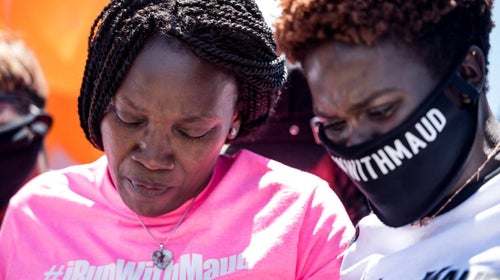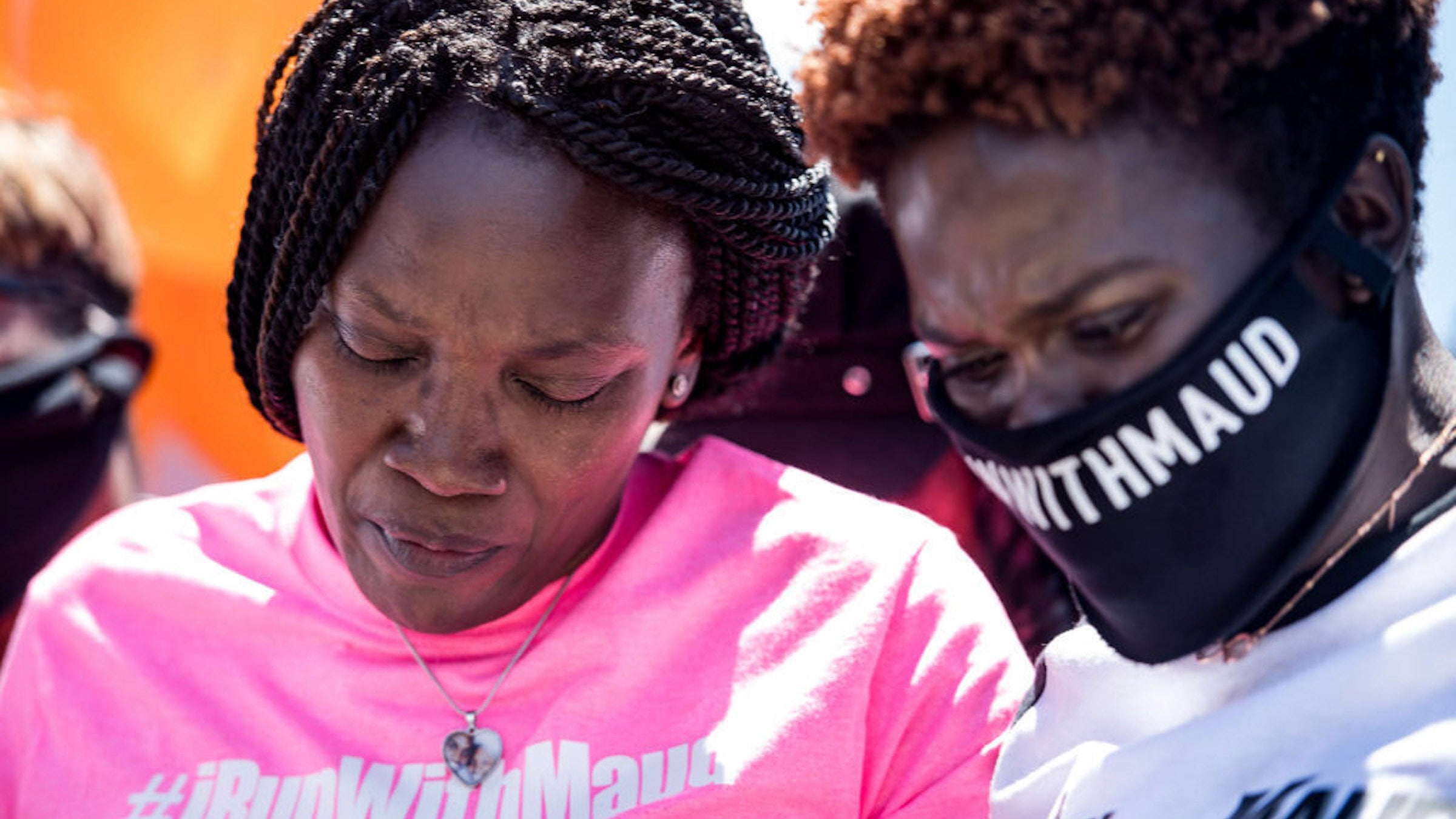It was just a few weeks ago that many of us ran in the name of justice for Ahmaud Arbery, a 25-year-old black man who was shot and killed after being chased by two white men in a pickup truck while he was out for a run, not far from his Georgia home. We posted photos of our watches and routes that day, used the hashtag #IRunWithMaud, and promised to do better as white members of the greater running community.
Arbery’s case hit close to home because most of us can relate to heading out in the afternoon into our neighborhoods to log a few miles. But what many of us have a harder time fathoming is that a simple jog can end in a racist, violent death for a black man in America.
Arbery’s death—and the horrific video of it—sparked a broader conversation within the sport, prompted by Alison Désir, a mental health coach and founder of Harlem Run, who was angry that more runners weren’t aware and it wasn’t given attention in the media. As the footage of the tragedy in Georgia circulated, she posted her thoughts on Instagram. Many high-profile readers took notice and shared it.
“I didn’t expect it to gain as much traction as it did…it was one of those moments for me that I felt like I was able to use my platform to bring voice to all the people I had talked to, all those people I had been texting, ‘Damn, we can’t even go running in the middle of the day,’” Désir said during a phone interview with Women’s Running. “I was able to give voice to all of us who share those concerns.”
While Arbery’s death may have had a direct connection to running, racism and white supremacy runs much deeper. Last week alone, we saw a white woman in Central Park’s Ramble call the police on a black man who asked her to leash her Cocker Spaniel. “I’m going to tell them there’s an African American man threatening my life,” the woman said. And she did. She lied during her call to 911, using her position of power as a white person to falsely accuse a black man, who was out birding, of attacking her.
In Minneapolis, a 46-year-old black man, George Floyd, was arrested for using a counterfeit $20 bill. A police officer pinned him to the ground with a knee on Floyd’s neck. Despite several minutes in which Floyd repeatedly said he couldn’t breathe, the officer continued to hold him down with a knee on his neck. Floyd died. The four police officers involved have been fired and the one who pinned Floyd to the ground was arrested on Friday.
On Friday the country awoke to the news of protests turned violent in Minneapolis and Louisville, Kentucky, where crowds were demanding justice for Breonna Taylor, a 26-year-old black woman and an emergency medical technician, who was killed in March by police who raided her apartment. In the ensuring days, protests have escalated throughout the country.
We ran for Arbery, but what are our next steps? Let’s begin in our own house—we don’t acknowledge enough how underrepresented black people are in U.S. distance running, accounting for less than 10% of participants, according to a Running USA survey. In fact, the New York Times reported that 92% of the nearly 500 women who raced the 2020 U.S. Olympic Marathon Trials in February were white.
Désir has also encouraged runners to learn how to become better allies for black people, indigenous people, and people of color. On Saturday she kicked off a free “Meaning Through Movement” series of virtual fitness and mental health events with a seminar called “Allyship is a Verb,” featuring Riddhi Sandil, a licensed psychologist and associate professor of practice at Columbia University, as well as cofounder of the Sexuality, Women and Gender Project at Teachers College.
What follows is Désir’s advice on how we can begin to educate ourselves on privilege, deepen anti-racism work, and become stronger allies in the sport and beyond. But remember—it’s just a place to start.
Acknowledge Your Privilege
The most obvious privilege is white privilege, but it’s not the only one. What does it mean to identify your privilege? For white people, it’s understanding that we have an advantage in society because we’re seen as the norm. Having white privilege means many aspects of life are easier than they are for black and brown people, regardless of wealth or gender.
“People who are shocked by what happened to Ahmaud Arbery are in the beginning of their white racial identity, just realizing, ‘Oh my god, my whiteness carries meaning,’” Désir said. “When you are anti-racist, you recognize the privilege you have and use it in service of other people.”
White runners generally don’t have to fear being mistaken for criminals while on a run in broad daylight through a residential neighborhood, for example. To acknowledge privilege isn’t to say you don’t experience other forms of discrimination, but the more we identify our advantages in society, the better we understand what others lack. And if you know what your privileges are, you can use them to help others.
“Each of us has our blind spots,” Désir said. “For example, somebody asked how to honor Ahmaud Arbery’s life if they’re not able-bodied. That’s something I need to think about, that not everybody is able to move their bodies in the same way. Privilege is an overwhelming issue.”
Don’t Fear Mistakes, but Own Them
Discussing racism, calling out white supremacy, and realizing the extent to which they do or don’t play a part in our lives is uncomfortable. If we commit to using our voices, however, we’ll all eventually say something offensive or inaccurate. We’ll experience backlash. And that’s okay. Messing up is part of being an ally—it shouldn’t stop anybody from using their privilege for good.
When that happens, apologize. Own your mistake. And move on.
“It’s inevitable,” Désir said. “Just say you’re sorry and really mean it.”
However, don’t ask the person who’s been hurt by your words or actions to help you correct them. Do that work on your own—seek out resources or other friends to understand why what you said or did was wrong and learn how to do it better next time.
“This whole work is painful,” Désir said. “But if you wait for a moment and say, ‘Okay, I’m learning something. It’s uncomfortable and I have an opportunity to do better,’ it lessens the wound.”
Take Responsibility for Your Own Education
Désir has put herself in the spotlight to help the running community learn more about white supremacy and racial injustice, but she isn’t obligated to answer every question, every time. Part of becoming an ally is taking ownership of our education to figure out how to take action after running for Arbery. Plenty of resources are available for those looking for more information or help. And if Désir or others play a role in our development, find ways to repay them and acknowledge the effort put in.
“I recognize there is a lot of labor in the work that I do. You’re putting yourself on the line, you’re putting yourself up for criticism and critique, you’re educating people, you’re doing so much work,” she said. “That was a personal breakthrough, to accept support in this way. It still feels funny to do but also appropriate, because I know for a lot of folks, I am their first teacher in this stuff.”
Take a Look at Your Own Community and Notice Who’s Missing
Is your running club lacking diversity? Are you running with only white people? Question why that is and how you can become a more inclusive group. That also goes for the professional training groups and beyond. The sport won’t become more inclusive if all parts of the running industry don’t take a look in the mirror.
“We need more representation of marginalized people in running magazines, more diverse writers, more diverse race directors, more diverse people leading the brands, more diverse coaches,” Désir said. “When I had a black male coach, I had a stronger connection. Those identities do matter. What are the ways you haven’t welcomed them? At every level we need to ask ourselves that in order to start the change.”
You Don’t Need a Big Platform to Make a Difference
During the seminar on Saturday with Sandil, a participant wondered without a big social media presence, could she still help? Some of the biggest changes start at the smallest levels, around kitchen tables.
“Start at home. At the next gathering after the pandemic, bring up a conversation about race and see how people react,” Sindil said. “My own commitment to allyship is to educate my family about black folk in America. It’s incremental change that has an impact. Very importantly, we have to create change on the microlevel.”
Start where you are. And much like running, it’s your consistency and commitment that will lead to improved outcomes for yourself and your community.


